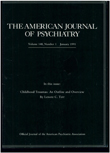How are depression and bulimia related?
Abstract
The idea that bulimia may be related to affective illness was encouraged by early reports of a high prevalence of clinical depression in bulimic patients as well as a high lifetime prevalence of depression in the families of these patients. More recent evidence suggests, however, that bulimia and major depression are distinct entities. The authors review clinical data, family studies, pharmacotherapy, and the neurobiology of bulimia and discuss the nature of the relationship between depression and bulimia.
Access content
To read the fulltext, please use one of the options below to sign in or purchase access.- Personal login
- Institutional Login
- Sign in via OpenAthens
- Register for access
-
Please login/register if you wish to pair your device and check access availability.
Not a subscriber?
PsychiatryOnline subscription options offer access to the DSM-5 library, books, journals, CME, and patient resources. This all-in-one virtual library provides psychiatrists and mental health professionals with key resources for diagnosis, treatment, research, and professional development.
Need more help? PsychiatryOnline Customer Service may be reached by emailing [email protected] or by calling 800-368-5777 (in the U.S.) or 703-907-7322 (outside the U.S.).



